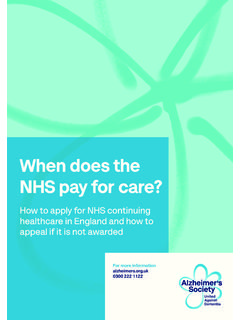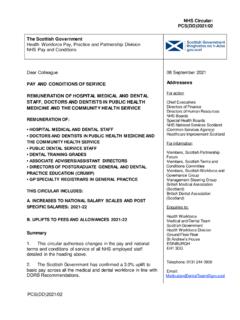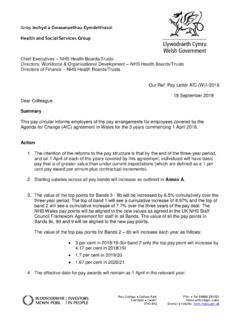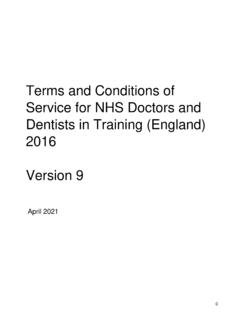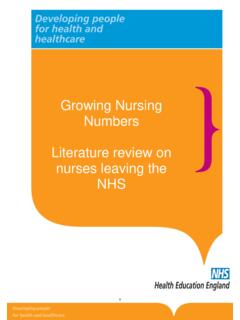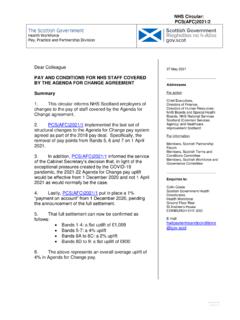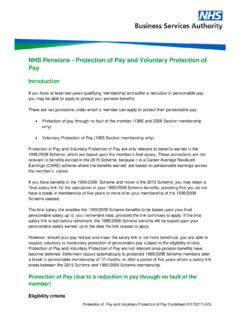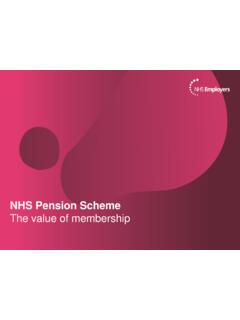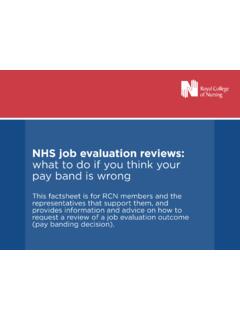Transcription of Guidance on NHS patients who wish to pay for additional ...
1 Guidance on NHS patients who wish to pay for additional private care Guidance on NHS patients who wish to pay for additional private care DH INFORMATION READER BOXP olicyEstatesHR / WorkforceCommissioningManagementIM & TPlanning / FinanceClinicalSocial Care / Partnership WorkingDocument PurposeGateway ReferenceTitleAuthorPublication DateTarget AudienceCirculation ListDescriptionCross RefSuperseded DocsAction RequiredTimingContact DetailsLondonFinal Guidance issued following full 12 week consultation process. N/ADepartment of Health23 Mar 2009 PCT CEs, NHS Trust CEs, SHA CEs, Foundation Trust CEs , Medical Directors, Directors of Nursing, PCT Chairs, NHS Trust Board Chairs, Special HA CEs, Directors of Finance, Communications Leads#VALUE!"Improving Access to Medicines for NHS patients " (Nov 2008)First bullet point under Section of A Code of Conduct for private Practice: Recommended Standards of Practice for NHS Consultants (Jan 2004)NHS Chief execs will wish to ensure local policies are consistent with this Guidance 011512 PolicyFor Recipient's UseGuidance on NHS patients who wish to pay for additional private careSW1A 2 NSPolicy Support UnitDepartment of HealthRichmond House 2 Guidance on NHS patients who wish to pay for additional private care Guidance on NHS patients who wish to pay for additional private care Prepared by Department of Health 3 Guidance on NHS patients who wish to pay for additional private care Contents Executive 1.
2 Revised Guidance on NHS patients receiving private 2. 3. 4. Revised 5. Roles and Responsibilities of Doctors in relation to this 6. Safeguards for the 7. Clinical 8. Charges for private care by NHS 9. Indemnity 10. Wider policy on private practice in the 4 Guidance on NHS patients who wish to pay for additional private care Executive summary The key points which NHS organisations should take from this Guidance are: NHS organisations should not withdraw NHS care simply because a patient chooses to buy additional private care. Any additional private care must be delivered separately from NHS care. The NHS must never charge for NHS care (except where there is specific legislation in place to allow charges) and the NHS should never subsidise private care.
3 The NHS should continue to provide free of charge all care that the patient would have been entitled to had he or she not chosen to have additional private care. NHS Trusts and Foundation Trusts should have clear policies in place, in line with these principles, to ensure effective implementation of this Guidance in their organisations. This includes protocols for working with other NHS or private providers where the NHS Trust or Foundation Trust has chosen not to provide additional private care. Strategic Health Authorities (SHAs) and Primary Care Trusts (PCTs) should work together to ensure that the Guidance is being implemented properly in their local areas. 5 Guidance on NHS patients who wish to pay for additional private care 1. Introduction This document provides new Guidance on how to proceed in situations where NHS patients want to buy additional secondary care services that the NHS does not fund.
4 It has been published in response to a review commissioned by the Secretary of State for Health and conducted by Professor Mike Richards, the National Cancer Director. Professor Richards report, published on 4 November 2008, showed that there was a great deal of confusion about the rules in this area. Existing Guidance was being interpreted differently in different places, and many patients were not clear whether they would still be entitled to NHS care if they purchased additional private drugs. Professor Richards recommended that: The Department of Health should make clear that no patients should lose their entitlement to NHS care they would have otherwise received, simply because they opt to purchase additional care for their condition; Revised Guidance should be issued as soon as possible to make this clear and to promote greater consistency across the NHS in England; and The Guidance should set out mechanisms to ensure that these cases are handled in a way that supports good clinical practice and is fully consistent with the fundamental principles of the NHS.
5 This document responds to those recommendations, outlining Guidance on NHS patients who receive private care and setting out a series of important safeguards. This document has been issued following full consultation. This Guidance comes into force on 23rd March 2009. It does not apply retrospectively. Revised Guidance on NHS patients receiving private care 2. Principles This Guidance is grounded in the fundamental principles of the NHS and any decisions about a course of action under this Guidance should be taken in accordance with those principles. The fact that some NHS patients also receive private care separately should never be used as a means of downgrading the level of service that the NHS offers. As affirmed by the NHS Constitution: the NHS provides a comprehensive service, available to all; access to NHS services is based on clinical need, not an individual's ability to pay; and public funds for healthcare will be devoted solely to the benefit of the people that the NHS serves.
6 As overriding rules, it is essential that: 6 Guidance on NHS patients who wish to pay for additional private care the NHS should never subsidise private care with public money, which would breach core NHS principles; and patients should never be charged for their NHS care, or be allowed to pay towards an NHS service (except where specific legislation is in place to allow this) as this would contravene the founding principles and legislation of the NHS. To avoid these risks, there should be as clear a separation as possible between private and NHS care. 3. Scope The general principles set out in Section 2 above apply to all NHS care, wherever it is delivered. However, this revised Guidance (from Section 4 onwards) applies only to all secondary and specialist healthcare (care normally provided in a hospital setting) in England.
7 It supersedes paragraph , bullet point 1 of the Code of Conduct for private Practice (2004)1, and all other previous Guidance on the same subject. This Guidance also applies to Primary Care Trusts and all providers of services to NHS patients , in so far as they provide or commission the provision of secondary and specialist healthcare. The boards of all provider organisations covered by this Guidance are responsible for ensuring their organisations comply with it. The Guidance should be read alongside the legislative framework, including equality duties, and organisations should comply with their legal obligations when making a decision. 4. Revised Guidance This Guidance establishes that, where a patient opts to pay for private care, their entitlement to NHS services remains and may not be withdrawn.
8 patients may pay for additional private healthcare while continuing to receive care from the NHS. However, in order to ensure that there is no risk of the NHS subsidising private care: It should always be clear whether an individual procedure or treatment is privately funded or NHS funded. private and NHS care should be kept as clearly separate as possible. private care should be carried out at a different time to the NHS care that a patient is receiving. private care should be carried out in a different place to NHS care, as separate from other NHS patients as possible. A different place would include the facilities of a private healthcare provider, or part of an NHS organisation which has been permanently or temporarily designated for private care, such a private wing, amenity beds or a private room.
9 Trusts may also want to consider using the services of a 1 7 Guidance on NHS patients who wish to pay for additional private care home healthcare provider where this is clinically appropriate. Putting in place arrangements for separation does not necessarily mean running a separate clinic or ward. As is the case now, specialist equipment such as scanners may be temporarily designated for private use as long as there is no detrimental effect to NHS patients . Departing from these principles of separation should only be considered where there are overriding concerns of patient safety, rather than on the basis of convenience. Such decisions should usually be agreed in advance with the Medical Director or equivalent. Where a decision has to be made without gaining prior approval from the Medical Director on the grounds of clinical urgency, the Medical Director should be informed as soon as possible afterwards.
10 A record should be kept of all decisions to depart from these principles. Case study for illustrative purposes Patient A is on a bone marrow transplantation unit in specialist isolation care. He wishes to pay for an unfunded drug in addition to his NHS treatment but his doctor judges that it would be clinically unsafe to move him from the specialist unit to receive this private care. His doctor discusses his case with the Trust s Medical Director and they agree that the serious safety risks to the patient in moving him justify departing from the principles of separation in this instance. The Medical Director and the doctor record their discussion and the decision they have reached. Patient A is allowed to have the unfunded drug delivered privately in the specialist unit. Patient A has to pay for the full cost of his private treatment.










